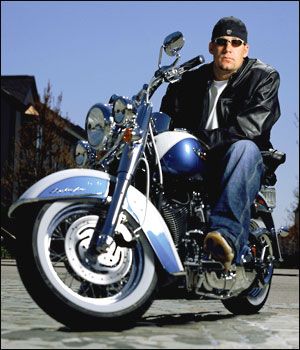Lawmakers and safety advocates in eight states are pushing for new motorcycle helmet laws in a new trend sparked by soaring motorcyclist fatalities and last year's crash of NFL star Ben Roethlisberger.
The effort to require helmets marks a more controversial approach to motorcycle safety than previous efforts stressing rider training and motorist education.
Proposed helmet laws have been strongly opposed by rider groups such as American Bikers Aimed Toward Education (ABATE), which say wearing a helmet should be a rider's choice. Those groups have helped push 27 states since 1975 to weaken helmet laws by applying them only to young riders.
Now "the balance is shifting," said Melissa Savage, a transportation analyst at the National Conference of State Legislatures.
"States are beginning to be concerned about the number of people killed in motorcycle crashes," said Barbara Harsha, head of the Governors Highway Safety Association, which supports helmet laws.
Motorcycle fatalities soared from 2,116 in 1997 to 4,553 in 2005 as other roadway deaths declined. Motorcycle riding also grew, but the fatality rate nearly doubled from 1997 to 2004, according to the National Highway Traffic Safety Administration (NHTSA).
The agency says helmets are "the most effective safety gear" for motorcyclists. But helmet use dropped from 71% in 2000 to 51% in 2006, NHTSA says, adding that helmets saved 1,546 lives in 2005.
Harsha said the push for tighter laws also is inspired by Roethlisberger, the Pittsburgh Steelers quarterback who broke facial bones when his motorcycle collided with a car last June. Roethlisberger wasn't wearing a helmet.
A helmet bill in the Hawaii House calls Roethlisberger's crash "a grim reminder of how important a helmet is."
Helmet-law proponents say it's a tough fight - bills have been defeated in five of the states: Arkansas, Iowa, Kansas, Montana, Oklahoma. After he introduced Delaware's first mandatory-helmet bill in more than 20 years on March 14, state Rep. Gary Simpson got e-mails from people vowing to campaign against his re-election. "It's a very strong lobby," Simpson said.
Colorado state Rep. Diane Primavera expects her helmet bill to be defeated but vowed to try next year. She said her measure drew attention to Colorado's status as one of three states with no helmet law. Twenty-seven states require helmets for riders under a certain age, usually 18 or 21. Twenty require them for all riders.
Paul Williams, state coordinator of the Helena, Mont., ABATE chapter, who this winter helped defeat his state's first helmet proposal in a decade, said helmet laws are inevitable. "I hate to say it, but I think it will eventually pass," said Williams. "In this country, we're slowly losing our rights for choice."

